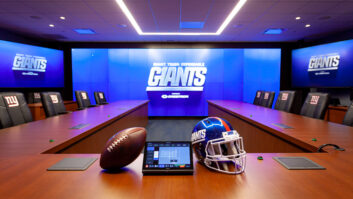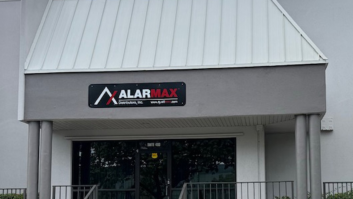

The heart of the induction loop system, sometimes known as a T-loop, is the amplifier. The D14-2 Dante hearing loop amplifier from Ampetronic is a dual-output, class-D unit with capacitive touchpanel, and browser-based control. The Wi-Fi accessible interface allows remote connectivity for setup, monitoring, and email alerts. To combat signal absorption by metallic objects, the D14-2 has 14 amps per loop output. Its dual-slope metal loss control can correct frequency response using its adjustable gain slope from 0dB to 4dB per octave in 0.25dB increments. The amp can operate in main, status, and quick modes. The 14-2 Dante model features a Dante specific RJ45 input for plug and play Dante network audio. A 6.35mm jack can connect to other slave amplifiers. There is a clipping indicator light on the front panel while temperature and loop errors are reported via the status menu. The loop monitor provides access to monitor actual loop current on a 3.5mm stereo headphone connector on front panel with channel A on left and channel B on right. The unit is rated IP20 for 20 percent to 90 percent humidity and a temperature range from zero to 35 degrees Centigrade. Listen Technologies is the exclusive distributor for Ampetronic in North America.
In the FM arena, Anchor Audio has the AL-9000 Assistive Listening Package consisting of one ALT-9000 transmitter and four ALB-9000 receivers using a 100-channel diversity wireless system operating from 902MHz to 928MHz. The transmitter features a front panel LCD display showing the group, channel frequency, antenna status, RF level, and IR set. The front buttons can also be used to set the transmitting power from 5mW to 100mW in four steps to provide a custom RF level for the environment in which it is used. The frequency synchronization to the receiver is set through the IR port which is also on the front of the unit along with a headphone jack with its own volume control. On the rear panel of the transmitter are two audio inputs, 12-18VDC power port and input audio volume knob. The WB-9000 beltpack transmitter runs on two AA batteries and includes a mic input and frequency set buttons. Each beltpack receiver is also AA battery powered and features the frequency buttons along with the IR port for automatic frequency synchronization with the transmitter. The headphone output jack is a 3.5mm mini operating at 6Ω with 105mW power output. The WB-9000 beltpack transmitter teams with eight ALB- 9000 receivers to form the Tour-9000 Tour Guide Package.

The ClearSounds Quattro 4 Bluetooth Listening System can be used by those with hearing aids or cochlear implants and with a headset (or SmartSound Earbuds) for anyone else. The presenter wears the remote mic and its signal is received by the Bluetooth Neckloop. To suit specific acoustic environments, the sensitivity of the remote mic can be adjusted with four settings to minimize any reverberation or background noise. Using the stereo Bluetooth headset profile (A2DP), the receiver can also communicate directly with another receiver similar to a walkie-talkie. It includes a stereo music playback control and a 3.5mm jack for the external stereo headset, an LED touchscreen with single button operation, volume control, and mute function.

Designed by Comtek Communications Technology for permanent installation in large venues, the CC-75 MLD can easily change frequencies. The PR75a receivers have an ATS (Automatic Tuning System) button which will retune to pick up the nearest compatible transmitter. Any receiver in the system can be taken from room to room and convert to the frequency being used there. The unit may be used with headphones or in a direct connection to hearing aids and cochlear implant processors. The NTC-102 neckloop can be used by those with hearing aids having a “T” coil, simulating the operation of an induction loop system. The BST-75 Mini Base Station operates in the 72MHz to 76MHz band allowing an RF power capability of 120mW and it’s so small that up to four units can be mounted in a single rack space. The multifunction RF indicator detects bad antenna load, RF presence, coaxial cable short, or open condition. When rack mounted, the BST-75 can use the RDA-2B remote dipole antenna or the Comtek “Phase Right Antenna” PRA-L72 high-performance omni antenna. If mounted in a standalone configuration the screw-in whip antenna TWA-75 is attached. The audio input is a combination 1/4in. mono and XLR balanced connector.

The Gentner Digital Package is an FM assistive listening system consisting of one TX-37A transmitter, four Digital-1 belt pack receivers, a plaque, an ADA requirement window sticker, transmitter antenna, 50ft. flexible coax antenna line and a rack mount kit. The TX-37A can be tuned to 37 of the FCC approved ALS channels from 72MHz to 76MHz and it can accept audio that is mic, line, or speaker level, balanced or unbalanced. Its RF output is adjustable for one quarter, half, or full power. The unit can transmit over an area of more than 700 square feet and it has a built-in test tone for easy receiver tuning. Each of the four Digital-1 receivers is tuned to lock onto the selected channel. Running on two AA batteries, the Digital-1 uses a large and easily operable on/off/volume switch and it’s available in four-packs and 10-packs. The 100Hz-10kHz frequency response is delivered through a 1/8in. mono headphone jack and it has charging contacts for using rechargeable batteries with an appropriate drop-in charger such as the BC-10B. Gentner ALS is a Starin company.

HamiltonBuhl has an FM solution with the Assistive Listening System ALS700 in which any number of receivers within 150ft. can be reached by the transmitter. The ADA compliant system comes with six receivers, six earbuds, one transmitter, and a carrying case. The FM signals are conveyed on two channels, 75.5MHz and 75.9MHz, while the receivers pick up the signal on the antenna which is integral to the headphone cord. They output their audio signal on 3.5mm jacks at a power of 100mW and run on three AAA batteries. The transmitter has both mic and line inputs and each is on a 1/4in. connector on the rear panel. On the front panel there are power, signal and channel indicator lights along with channel selection and volume knobs. Each receiver has channel indicator lights, channel selector, and gain knob.

Offering another dimension for smartphones, Listen Technologies makes Wi-Fi streaming available for over two billion users around the world with ListenWi-Fi. It can use one or more Wi-Fi access points (WAP) with the PLS-900 Personal Listening Server, PL-400 audio interface, and PL-301A WAP. To cover an even wider area using the PL-330-E4 Expansion Kit, the server is augmented with the PL-320 WLAN controller, the PL-310 PoE switch, and multiple WAPs, each of which can support up to 100 users. These have dual-band 2.4GHz and 5GHz operation. The server has a configurable Internet passthrough, remote access for setting volume levels and free automatic software updates are available online. As many as 24 stereo or 48 mono audio sources can be connected and transmitted. All users have to do is download and install the free app and then select the channel.

Nady Systems offers a 72 MHz to 76MHz FM system with a selection of eight channels on the ALD-800 Multiple VHF Wireless Assistive Listening System. The transmitter has both mic and line level inputs, an extendable antenna, automatic level control, power and audio level LEDs along with a front panel power switch. With the FM system, any number of receivers can be used. The tiny receivers include binaural earphones, volume control, power LED, and an antenna that is integral with the headphone cord. Each runs on a disposable or rechargeable 9V battery. The transmitter connects to the audio line output of the sound system and carries the signal or that of an optional microphone some 300ft. to listeners.

The Satellite III large-area induction loop system from Oval Window Audio is compatible with all telecoil-equipped hearing aids and cochlear implants. The loop can cover enough area for about 300 users and for those who do not have telecoil hearing aids the induction loop receiver will provide good reception and quality sound. Receiver features include LED confirmation of loop signal strength, noise filter switch, battery level indicator, volume, and on/off control, stereo headphones, and a neck cord. The rear panel has a power switch, AC outlet, dual RCA input connectors, screw terminal inputs and outputs along with a screwdriver adjustable EQ control. The system provides a 250ft. two-conductor 14-gauge clear wire, a 500ft. spool of loop wire, comprehensive instructions and telephone tech support.

There are three frequency options for the Peavey Assisted Listening System 72.1 MHz and single or dual transmitter rack mount kits are available. The system range is 300ft. and the signal from the line or record output on a sound system is fed to the input of the transmitter. There is an optional microphone to use and the pocket-size receivers have an adjustable volume control with high-performance headphones. As with all FM systems, the size is expandable simply by adding receivers. The base unit has an audio input level control, automatic level control and extendable antenna. The front panel has the mic input on a 1/4in. jack, power switch, power indicator, and modulation level LED. The system runs on 9V and there is an AC/DC adapter included.

By simply downloading the Personal Hearing Assistant app, the users of the Sennheiser MobileConnect system can hear low latency audio streamed directly to their iOS and Android smartphones or tablets. The base of the system is the ConnectStation CSM1-M server, which provides DHCP service to the optional Zoneflex 7372 wireless access point and clients. The server has four inputs on 1/4in. jacks on the back panel and there is an input audio gain adjustment. There is also a 15-pin analog breakout cable, an Ethernet network terminal, ADAT/SPDIF loop-through, and an AC power connection. The system can be operated in either stand-alone or Integrated mode. Included in the box are the CS1-M server, Wi-Fi high performance access point, Power adapter for Wi-Fi AP, power cable, network cable, and quick guide.

The PST-170 Transmitter and SR-400 Receiver from Telex Communications form a solid FM assistive listening system with versatility and a very small size. The PST-170 transmitter is a 17-channel belt-pack unit that runs on two AA batteries for around eight hours. It uses an easily concealed trailing wire antenna and it has two audio inputs. One is for mic level signals and the other is a line input. Other upper panel features include a power switch, overmodulation indicator, channel assignment display, and a lockout light to show that the transmitter is protected from unauthorized frequency changes. The SR-400 receiver also operates on two AA batteries and it has a thumbwheel knob for power on/ off and volume level. The system can be used in Enhanced Dynamic Range (companded) mode, which improves the signal-to-noise ratio. As with the transmitter, the receiver has a channel lockout feature. The low-battery indicator is activated when the power level is at around 10 percent.

Williams Sound brings DANTE connectivity to induction loops systems with the 48-volt DL219 SYS 2 2.0 D. The amplifier is a 2RU rack mounted unit with the option of a single 12A output for large induction loop coverage or two 10A outputs for phase loop arrays. It also has a variety of inputs including AES/EBU, DANTE, mic level, line level, and 70V/100V. On the rear panel are RS232, USB, and Ethernet ports along with line level and loop outputs. For setup, there is also an internal frequency generator with 100Hz, 500Hz, 1kHz, 2.5kHz, and 5kHz tones along with pink noise. The front panel shows a backlit LCD screen and control button/dial for using a range of features such as input mixing, parametric equalization, compression, frequency-shaping, metal loss compensation, high- and low-pass filters, AGC, and audio delay.









